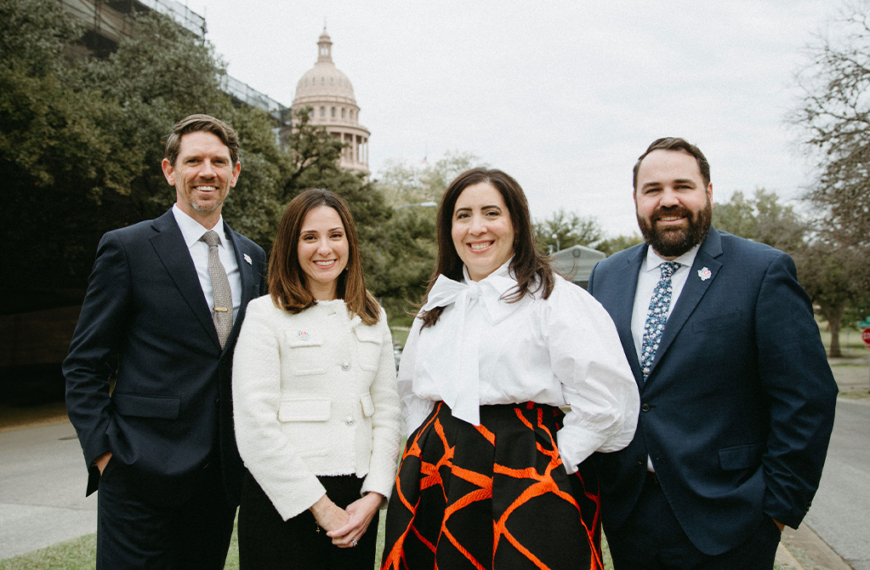It’s one thing to tell a lawmaker what your hospital – and others – need from policymakers in order to thrive. It’s another thing entirely to show them.
While getting in touch with legislators at their offices is a key part of being a hospital advocate, hosting lawmakers at your facility – offering them an up-close look at your day-to-day operations, and why you and other Texas Hospital Association members are asking for their help at the state or nation’s Capitol – is an invaluable chance to for them to absorb those lessons.
In turn, they may even use personal anecdotes from the visit as fodder for their reasoning and rhetoric, explaining in a legislative committee or on the House or Senate floor why they’re supporting or opposing a particular bill – and influencing other lawmakers to see it their way.

So showing a lawmaker around your hospital can be an extremely effective piece of advocacy. But these visits require extensive planning, an understanding of the needs of legislators and, most likely, a rehearsal to make sure you and your staff are prepared.
The best time to meet with federal lawmakers is when they are home in their districts between legislative sessions. For Congress, that will be the case beginning this Friday, April 11, when congressional lawmakers leave Washington, D.C., and begin their two-week work period. Here’s a guide from THA on how to plan for and carry out a tour of your hospital with a representative of your facility’s district.
Getting Started
- First, appoint someone to take charge of the visit and be the primary point of contact with the legislator’s office. Since you likely will be visiting several areas of the hospital during the tour, it may be advisable to establish an ad-hoc planning committee. Members of the committee could include representatives from senior management, the board of trustees, nursing and medical staffs, the public relations/marketing department and managers from the key areas you plan to visit.
- Assign someone to coordinate logistics, such as reserving a meeting room, planning any meals or refreshments or making parking arrangements.
- Know the purpose of the visit. If your visiting lawmaker is new in office, you need to establish a relationship with him or her. For an incumbent, the visit can serve as a reminder of how important the hospital is to the community – both in terms of economic impact and health care delivery. In either case, the visit provides an opportunity to discuss issues of concern and to establish the hospital as a resource for information on health care topics.
- Do your homework. Does the legislator have any special interests or hobbies? Are they knowledgeable about health care issues? Do they personally know someone at the hospital – a board member, employee or member of the medical staff? Has the legislator or a family member ever been a patient at your hospital? If so, were there any issues associated with the stay?
Issuing the Invitation
- Contact your legislator as soon as possible. It probably will take a couple of weeks to work a hospital visit into the legislator’s schedule. If you’re scheduling between the end of the election and the beginning of the new legislative session, try for the earliest possible date.
- For congressional lawmaker visits: Reach out to the lawmaker’s office beforehand to find out the best point of contact, then send an email to the lawmaker’s scheduler.
- For a visit from a member of the Texas Legislature: Send a formal letter of invitation from the CEO and/or board chairman (or a board member who has a personal relationship with the legislator). The invitation should be sent to the district office and also send a copy to the Capitol office. Be sure to extend your invitation to include the legislator’s key staff members. These are the people you will be dealing with during the state legislative session.
- Within a couple of days, the CEO or board member should follow up with a telephone call to the scheduling office. At this time, potential dates for the visit can be discussed.
- Once the visit has been scheduled, send a letter of confirmation and note any special arrangements (e.g., where to park, which entrance to use, whether lunch will be served, etc.). It’s also a good idea to include an overview of the agenda and a list of who will be involved. Call or email the office again on the day prior to the visit to confirm that the legislator is still planning to come. Lawmakers’ plans can change at the last minute, so be flexible.
- Some legislators may want to receive more detailed information about the visit in advance. You may be asked to provide biographical information on key leaders of the hospital, a copy of your annual report, or other information. Be prompt in sending any requested information.
Planning the Visit
- Organize the visit so that it includes a brief tour of two or three important areas of the hospital, as well as a “sit-down” meeting if time allows. Use the tour as a backdrop for your discussion of key legislative issues. You can reiterate these points again during the meeting. Allot about 60 to 90 minutes for the tour. Depending on the time of day and who is involved, the meeting could be a lunch or small reception.
- Provide opportunities for the legislator to meet key hospital staff, such as a physician, a hospital trustee who knows the legislator or a hospital employee such as a nurse or social worker who works directly with patients. Inform participants in advance so they can be prepared.
- Walk the tour yourself in advance to make sure everything is in order and that you are prepared to deliver your intended message.
- Notify department managers of the visit, especially those in tour areas, and ask them to inform their staffs of the upcoming visit.
- Prepare for questions that the lawmaker may ask.
- Prepare a fact sheet on your hospital and other “take away” materials to give to the legislator. Don’t overwhelm your guest with marketing brochures; focus on information that supports your key messages.
- Notify the Texas Hospital Association about the planned visit. A member of THA’s advocacy staff can provide you with background information on the legislator and/or help you compile any statistics or information needed to illustrate your concerns.
- Make arrangements with your hospital’s public relations department to photograph the legislator’s visit and include a story on the visit in your hospital’s publications and social media channels, if the legislator grants permission to do so.
- On the day of the visit, send a reminder to the staff in the areas to be visited.
After the Visit
- Send a thank-you note, thanking the legislator for their time and briefly restating your willingness to serve as a resource on health care-related issues. The letter should be signed by the same person or people who issued the invitation.
- Be sure to include any follow-up information that was promised.
- Send the legislator copies of any photos and/or articles about the visit that appeared in your hospital’s publications and/or social channels.
- Evaluate the visit internally, noting both strengths and weaknesses for use in planning future visits.
- Send a report of the visit to THA’s advocacy staff.
- Maintain and build the relationship with the lawmaker. Keep legislators informed through regular updates about your hospital. Add them to the mailing list for an existing newsletter, or prepare a special mailing – perhaps quarterly – just for them. Offer to assist with background material on health issues, and always respond to information requests promptly.
Related articles from The Scope
Trump, Capitol Hill and Texas Hospitals: The First 100 Days
Updated Apr. 3, 2025: As a new administration and a…
Staying Alive: The Facility Fee Debate
Talk to Frank Beaman about the latest legislative push to…
Preventing New Plagues: THA Committed to Defending Time-Tested Vaccines
Typically, policy disagreements we at the Texas Hospital Association have…
Use Strategic Partnerships to Improve Rural and Community Hospital Performance
Why Relationships Matter Relationships play a pivotal role in the…
COVID-19 Heroes Day: Honoring Sacrifice
Updated Feb. 4, 2025. (Originally published Feb. 2024.) For health…
Meet THA’s Lobby Team for the 89th Texas Legislative Session
Last week, the 89th Texas Legislature gaveled in – and…







